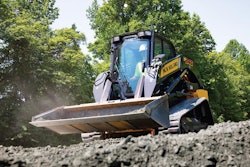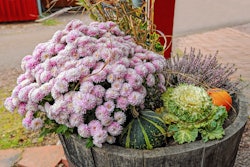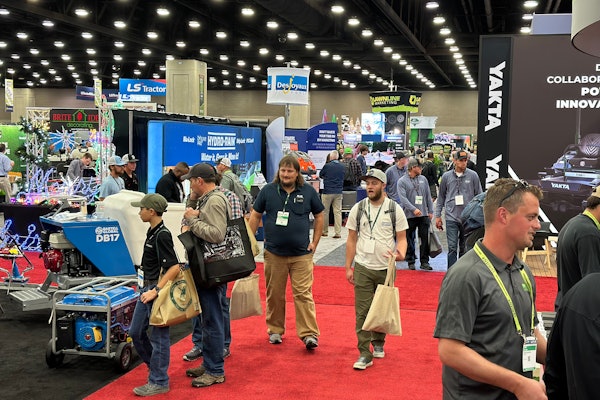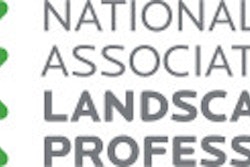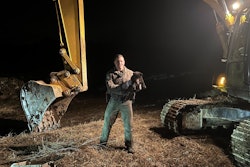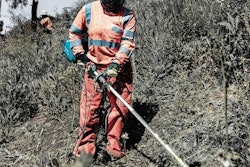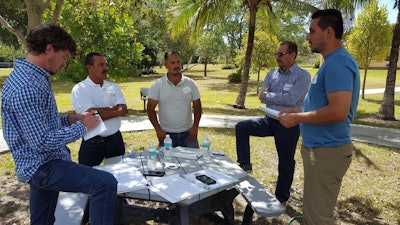 NHLA offers popular educational sessions like its Train the Trainer program.
NHLA offers popular educational sessions like its Train the Trainer program.Photo: NHLA
The National Hispanic Landscape Alliance (NHLA) is only seven years old, but it has made tremendous strides since its formation.
Two dynamics were coming together in 2010 that gave rise to the association. One was a growth of Hispanic-owned landscaping companies and a need for more programming in Spanish, and the other was the realization the green industry was not leveraging Latino political power.
Founded on March 11, 2011, six contractor companies and five manufacturers who served as supporting members joined together with the goal of helping Hispanics in the industry become more successful and making their voices heard.
Those first six contractor companies were CoCal Landscape in Denver, Colorado, Rulyscapes in Centreville, Virginia, Pacific Landscape Management in Portland, Oregon, Lawn Management Company in Houston, Texas, and The Landscape Partners in Dallas, Texas.
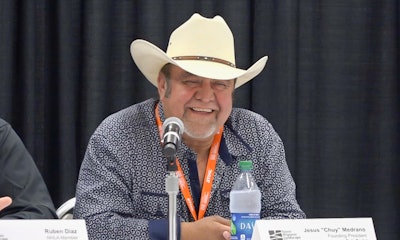 Founding president Chuy Medrano
Founding president Chuy MedranoPhoto: NHLA
“It was time,” says Chuy Medrano, founding president of NHLA and owner of CoCal. “We had built a foundation for success through hard work and learning the business basics, but to take the next step, we had to take a wider view. We had to look beyond what we were doing. We also had to look closer at ourselves. As we did that, we could better see opportunities and threats, and our strengths and weaknesses came into better focus too. As some of us started sharing more, we realized that we could help each other. It started there. Prior to forming the NHLA there had been some efforts here and there to engage Hispanics and offer training in Spanish, but nothing consistent.”
Since its formation, NHLA’s membership has grown to more that 800 contractor companies in 32 states, 12 supporting member companies and more than 100 student members.
“It’s been a blessing that as many have joined the association as they have,” says Ralph Egües, executive director of NHLA. “There are many more that we’d like to bring in. The real power of the National Hispanic Landscape Alliance is the membership. We foster a sharing community and we really delight in helping members help one another.”
Why NHLA is important
In every state, the percentage of Hispanics who are employed in the landscape industry exceeds the percentage of Hispanics participating in the economy in general. Also, in all but six states, the presence of Hispanics in the green industry is twice that of Hispanics in the economy in general, according to Pam Berrios, president of NHLA.
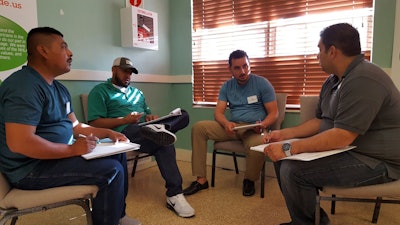 Photo: NHLA
Photo: NHLANot only are Hispanics filling the labor positions in the industry, but they are also able to take advantage of entrepreneurial opportunities.
“More than 16 percent of landscape industry business owners are Hispanics compared to only 8.6 percent of business owners generally in the U.S.,” Berrios says.
Yet while there are plenty of opportunities for Hispanics in the landscape industry, many are unaware of them and only about one-third are fluent in English, hindering them further.
“A lot of Hispanics struggle with all aspects of irrigation, pesticides, other aspects of horticulture, management and leadership topics, administration topics, how to set up a business properly, etc., and we have programs to help address all of the above and we offer those most often in Spanish,” Egües says.
“The NHLA serves as a gateway for Hispanics to more fully engage as industry professionals and obtain the knowledge and competencies needed to achieve even greater successes,” Berrios says.
Accomplishments
According to NHLA’s president-elect, Mari Medrano, the organization has had many wins over the years.
A majority of this has occurred through bridging cultural and language gaps between Hispanic workers and their employers, Hispanic customers and dealers and manufacturers by providing the information needed to help make them more competent and successful.
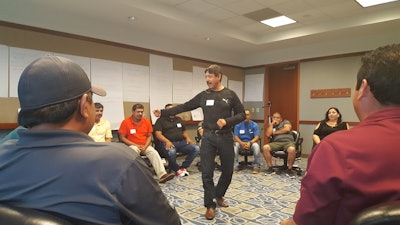 Photo: NHLA
Photo: NHLAOne of the areas that NHLA works to help in is workplace fatalities and injuries. While over the last decade, workplace deaths have dropped 20 percent, they have risen among Hispanic workers by almost 35 percent.
In fact, Hispanics are 18 percent more likely to be injured or killed while working than any other ethnic group, according to Egües.
“Due to communication and cultural barriers, many Hispanic and Latino workers struggle to communicate with supervisors and co-workers and thus lack a thorough understanding of safety regulations and employee rights and responsibilities,” Egües says. “The safety and well-being of workers is important to all employers, but many fail to provide information and instruction in a manner that everyone in their workforce can fully comprehend.”
Year after year, NHLA has offered more programs and Egües doesn’t believe they will ever reach their goal, but rather that the bar keeps getting set higher after succeeding in a certain area.
“Once you meet one need, a different need comes up, and that’s wonderful because it just speaks to the fact that we’re making a difference in people’s lives and that there’s more wanted of what we have to offer,” Egües says.
Just recently, NHLA hosted its three-day Train the Trainer program in Chicago and offered it for the first time in Spanish after reworking the program. Employees from companies in the area like Sebert Landscape and Mariani Landscape participated in the event.
“They’ve all reported that their employees have just been transformed,” Egües says. “They’ve come back with a confidence and a competence that they didn’t have and all of them are excited for us to do it again.”
Another major aspect of NHLA is its advocacy. This includes topics such as the H-2B visa program and the defense of turfgrass as a valuable part of the environment.
“The NHLA has also been able to leverage Latino political power to help advance industry interests, particularly as these relate to workforce availability generally and the H-2B visa program in particular, and to model codes and standards, and ‘green’ building systems,” Medrano says.
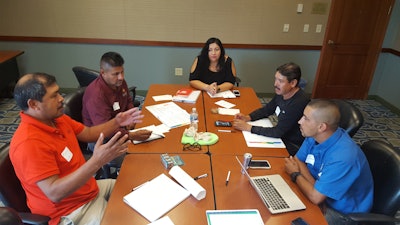 Photo: NHLA
Photo: NHLANHLA advocates for the expansion of the H-2B program, as it helps landscaping companies meet their seasonal demands while creating jobs U.S. Hispanics are well suited for with their industry knowledge and linguistic competencies.
Most recently through lobbying, the NHLA was able to convince the United States Hispanic Chamber of Commerce to call on Congress to grant additional visas for seasonal workers.
“We are strong advocates for immigration done right,” Medrano says. “The H-2B visa program is a program that works to meet the needs of reputable employers and law-abiding foreign workers, and it needs to be expanded to meet the documented needs of our economy. The NHLA will continue to press elected officials in Congress directly, will continue to build a broader base of support by other Hispanic serving organizations and will collaborate with other trade associations to enable the legal sourcing of seasonal foreign workers in greater numbers to fill jobs that Americans in sufficient numbers do not wish to take.”
Why should you become a member?
Because NHLA is still fairly young, there is still the misconception that a landscaper has to be Hispanic in order to become a part of the organization.
Yet any individual or company that provides landscape services can become a member.
“In fact, the members that receive the most benefits are not necessarily Hispanics, but business owners who employ a large number of Hispanics,” Berrios says. “We help them bridge the cultural and linguistic gaps that often exist between them and their workforce. By doing this, we not only give workers the opportunity to achieve upward mobility within the company, but we help business owners lower turnover and build a greater sense of community among and with their employees.”
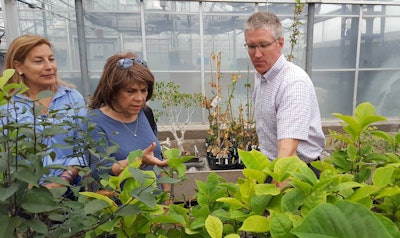 Photo: NHLA
Photo: NHLAFor the price of annual dues starting at $200, members can save 10 to 20 percent when buying equipment from certain brands such as Ferris, John Deere, Cub Cadet, Toro, Husqvarna and Kubota. Members also receive discounts on training programs like Train the Trainer and Lawn Millionaire Mastery.
Yet the greatest benefit NHLA says it offers is the power of peers sharing what they know.
“Throughout the years, not only has it helped me with all the knowledge and experience and networking, but it was also the peer-to-peer coaching we get from companies that are bigger than myself,” says Raul Berrios, a member of the board of directors for NHLA and principal of Rulyscapes. “I was able to go and visit them and see how they work. At the end of the day, they become friends of yours who help you as much as possible, and then I had the opportunity to do the same thing with a smaller company than mine and do the same thing, so that was the key. That’s what I really love about this organization.”
Egües says there are multiple stories of members helping one another over the years and often a company visit to another member’s operation is an eye-opening experience for other members. Raul Berrios agrees the ability to visit other’s businesses and that they take the time to share how their company runs is invaluable.
“We can learn from each other in little ways that can make big differences,” Egües says.
The main goal of NHLA is member success, and the organization believes it can achieve this by building a network of member companies that are eager to share and learn from one another
“Many of our members started with very little and have now become successful leaders where they work or more successful business owners,” Medrano says. “Regardless of your role, the NHLA can help you achieve more.”
